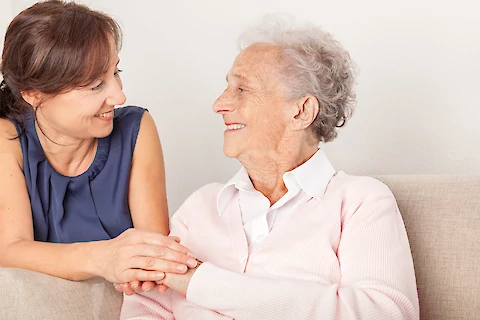
Caring for a senior family member is both rewarding and challenging. When a dementia diagnosis is introduced, it adds a new layer of complexity. Caregivers might initially feel overwhelmed and unsure of what to expect as their loved one's cognitive abilities change. This Senior Helpers post explores how caregiving responsibilities may evolve as dementia progresses and offers tips and guidance for navigating this new territory.
Early Stages of Dementia
In the early stages of dementia, you may notice your senior family member experiencing memory loss, difficulty with daily tasks, or changes in their personality and behavior. It is important during this time to encourage their independence and participation in activities while also being there to assist when needed.
Establishing a routine can be beneficial. It helps create a sense of structure and predictability for your loved one. Additionally, open and honest communication about the diagnosis allows you both to come to terms with the changes that lie ahead.
Middle Stages of Dementia
Caregiving responsibilities are likely to increase as dementia progresses into the middle stages. You may need to provide more supervision and assistance with daily tasks, as well as manage any behavioral and mood changes that may arise. Prioritizing your loved one's safety and security at home becomes crucial during this stage.
Patience and flexibility will be necessary as you adapt to their changing needs. Use visual cues and reminders to help support their memory and seek out support from friends, family, or dementia-focused support groups when needed.
Late Stages of Dementia
The level of care required increases significantly in the later stages of dementia. You may need to assist with personal care. This could include bathing and dressing, mobility, and managing medical needs and medications. It is essential to provide comfort and emotional support during this time. Your loved one may have difficulty communicating or understanding their surroundings.
Remember to prioritize self-care and consider respite care options if necessary. It is the smartest way to ensure you can continue providing the best support possible for your loved one. In some cases, professional help or assisted living options might have to be considered to ensure their safety and well-being. Focusing on the quality of life and preserving your senior loved one's dignity should be at the forefront of your efforts during this time.
Resources for Caregivers
Navigating dementia caregiving can be overwhelming, but you don't have to do it alone. Numerous resources are available for caregivers dealing with dementia. The Alzheimer's Association offers a wealth of information, support, and education. The National Institute on Aging provides resource guides and research updates. Look for local support groups and organizations for more specialized resources tailored to your community.
Senior Helpers Offers Specialized Care Services
Senior Helpers provides high-quality, in-home care senior services. If you live in the Hot Springs, Garland, Montgomery, or Saline County areas and are caring for a loved one with dementia, Senior Helpers Hot Springs is here to help. Contact us today to learn more about our specialized dementia care services and how we can support you and your family during this challenging time.